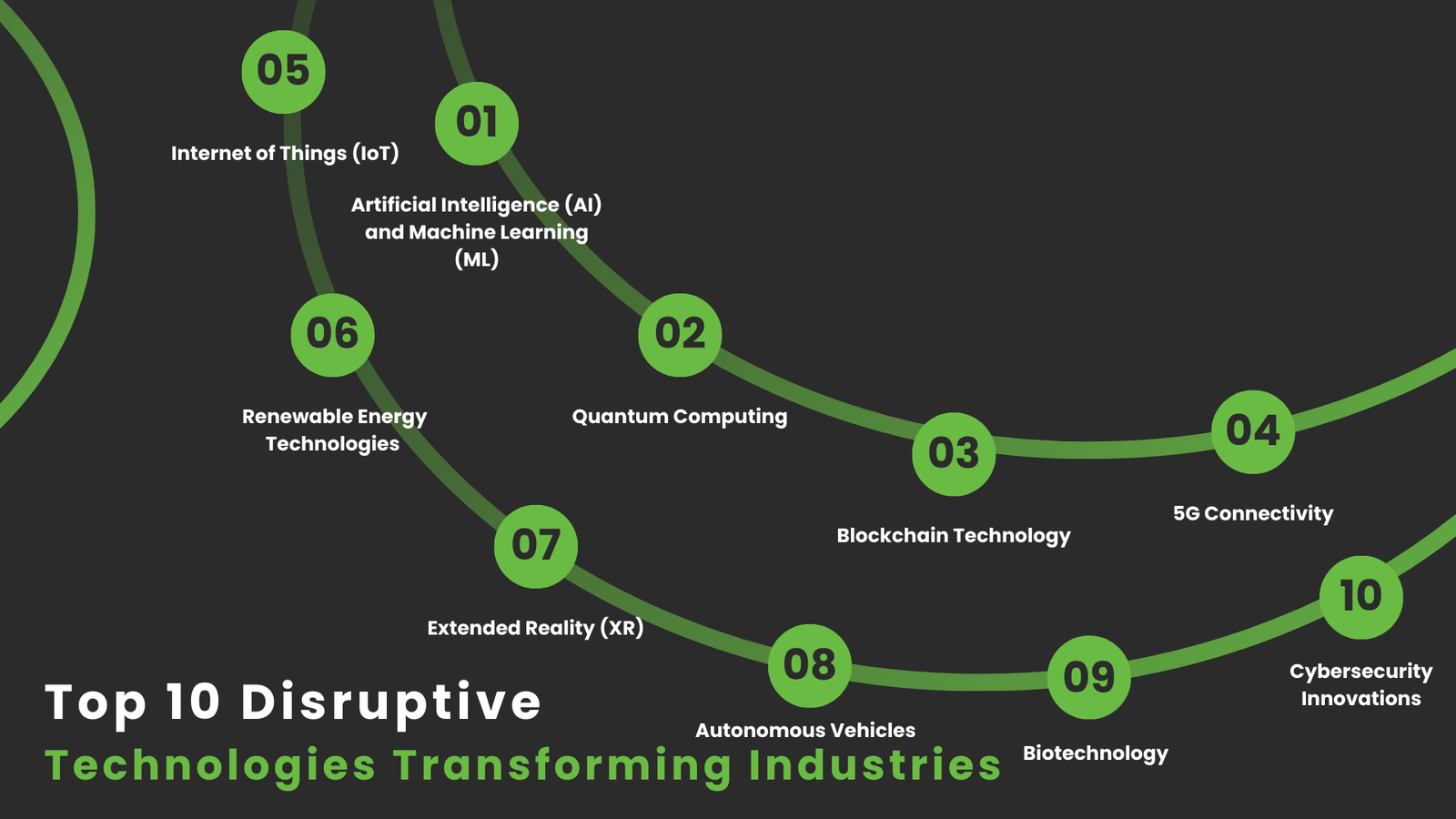Top 10 Disruptive Technologies Transforming Industries in 2024
Introduction
The technological landscape is evolving rapidly; consequently, 2024 is set to be a landmark year for innovation. Indeed, from artificial intelligence to quantum computing, these disruptive technologies are poised to redefine business models and consumer experiences across various sectors. Moreover, there’s a deep dive into the top 10 game-changing technologies driving this transformation.
Advanced technologies such as artificial intelligence, quantum computing, and blockchain have played an important role in various industries. These technologies are not only saving time and money but also opening up new business horizons. In this article, we’ll highlight ten cutting-edge technologies that are changing industries in 2024.

1. Artificial Intelligence (AI) and Machine Learning (ML)
What It Is
Artificial Intelligence and Machine Learning involve creating algorithms that enable machines to simulate human intelligence and learn from data.
Furthermore, in 2024, artificial intelligence (AI) and machine learning (ML) have revolutionized many industries. As a result, these technologies are helping to make the business world faster, more efficient, and more automated. In particular, the use of AI and ML is increasing day by day in the healthcare sector, from disease diagnosis to finance, where it helps in financial analysis and risk assessment.
Impact on Industries
- Healthcare: AI-powered diagnostic tools enhance accuracy in identifying diseases like cancer.
- Retail: ML algorithms personalize shopping experiences.
- Finance: Fraud detection systems are now more efficient with AI.
Key Stats:
- AI adoption is expected to contribute $15.7 trillion to the global economy by 2030.
- Over 80% of businesses will be integrating AI in some capacity in 2024.
2. Quantum Computing in Disruptive Technologies:
What It Is
Quantum computing leverages quantum mechanics to process data exponentially faster than traditional computers.
Quantum computing is a new and revolutionary technology that is bringing significant changes in the fields of Artificial Intelligence (AI) and Machine Learning (ML). Unlike traditional computers, quantum computers process information in a new way, giving them immense power to solve complex problems. This technology provides faster and more efficient ways to process data, making AI and ML models more accurate and faster.
The use of this technology is opening up new possibilities in the field of AI and ML, and it can become a powerful tool for businesses and scientists in the future. Quantum computing will significantly increase the speed of research, analysis, and decision-making.
Transformative Applications
- Pharmaceuticals: Accelerating drug discovery.
- Logistics: Optimizing supply chain management.
- Finance: Enhancing portfolio risk management.
Example: Companies like IBM and Google are leading advancements in quantum technologies.
3. Blockchain Technology in Disruptive Technologies:
What It Is
Blockchain is a decentralized ledger technology that ensures transparency and security in transactions.
Given the growing impact of blockchain, major companies such as IBM and Microsoft are investing heavily in the field. In 2024, more uses for this technology are being discovered, which will help make various industries more efficient and safer
Key Use Cases
- Finance: Secure and efficient cross-border payments.
- Supply Chain: Improved traceability of goods.
- Healthcare: Protecting patient data.
External Link: Learn more about blockchain applications.
4. 5G Connectivity
What It Is
5G is the fifth generation of mobile networks, offering ultra-fast internet speeds and low latency.
5G connectivity, which has come in the form of the fifth-generation network, has revolutionized the field of artificial intelligence (AI) and machine learning (ML). 5G’s high-speed and low-latency network services open a new door for AI and ML models, significantly improving data transmission speed and systems performance. Thanks to 5G connectivity, AI and ML systems can make faster decisions and work more efficiently.
Thanks to the advantages of 5G networks, faster and more accurate analyses are possible in automated vehicles, healthcare, the Internet of Things (IoT), and other fields. For example, automated vehicles that use AI and ML can now make more accurate decisions through high-speed communication systems with the help of 5G. Similarly, 5G’s high-speed connectivity in the healthcare sector helps doctors analyze patients’ conditions in real time, enabling immediate treatment.
Industry Disruption
- Entertainment: Revolutionizing gaming with real-time streaming.
- Healthcare: Enabling remote surgeries.
- Manufacturing: Supporting smart factories.
Stat: By the end of 2024, over 1 billion devices will operate on 5G networks.
5. Internet of Things (IoT)
What It Is
IoT connects physical devices to the internet, enabling real-time data exchange.
The Internet of Things (IoT) is a network in which various devices and sensors are connected and exchange data. When this is combined with artificial intelligence (AI) and machine learning (ML), it becomes a powerful combination that is revolutionizing the world. With the help of AI and ML, IoT devices not only collect data but also make automated decisions by understanding it, which increases their functionality and efficiency.
These technologies not only improve efficiency in industries but also make daily life more efficient and comfortable. Through IoT, the volume of data increases, and its analysis and use with the help of AI/ML becomes more useful and faster, opening new avenues for the future.
Benefits
- Smart Homes: Energy-efficient appliances.
- Agriculture: Precision farming techniques.
- Transportation: Enhanced vehicle tracking and fleet management.
6. Renewable Energy Technologies
What It Is
Innovations in solar, wind, and hydrogen energy are driving sustainable solutions.
Artificial intelligence (AI) and machine learning (ML) are revolutionizing renewable energy technologies. These technologies help predict energy production, increase the efficiency of systems, and reduce energy wastage. For example, AI/ML is being used in solar and wind power plants to improve their production speed and make energy use more efficient.
The energy storage capacity of renewable energy systems is also being improved with the help of AI and ML, which ensures a constant supply of energy. These technologies are making energy management more automated, efficient, and environmentally friendly, helping to reduce environmental impact.
Sector-Wide Changes
- Energy: Smart grids for efficient power distribution.
- Transportation: Electric vehicles with extended range.
- Construction: Green buildings powered by renewables.
Highlight: Governments globally are investing heavily in renewable energy projects.
7. Extended Reality (XR): AR, VR, and MR
What It Is
Extended Reality (XR) encompasses Augmented Reality (AR), Virtual Reality (VR), and Mixed Reality (MR).
In MR, building bridges between the real world and the digital world is accelerating, particularly with the help of AI and ML. Furthermore, these technologies make XR experiences smoother and more effective, revolutionizing the education, health, and entertainment industries. In addition, with the help of AI and ML, XR technologies are becoming more personalized and automated, thereby providing better customer experiences.
Transformations
- Education: Immersive learning experiences.
- Retail: Virtual try-ons for fashion and furniture.
- Healthcare: Advanced surgical training modules.
8. Autonomous Vehicles
What It Is
Self-driving cars and drones utilize AI and IoT to operate without human intervention.
Moreover, the use of artificial intelligence (AI) and machine learning (ML) is revolutionizing autonomous vehicles. Specifically, these technologies enable vehicles to drive autonomously on the road. Additionally, with the help of AI and ML, vehicles analyze their environment, make decisions by understanding road conditions, as well as the presence of other vehicles and pedestrians, and ultimately take quick actions to avoid accidents. As a result, traditional driving errors and accidents are reduced.
In addition, AI and ML continuously improve systems in automated vehicles, such as navigation and speed control, so that vehicles can drive more safely and efficiently. These technologies make vehicles more intelligent, which can automatically adjust their speed and direction according to traffic flow, weather conditions, and road conditions. Automated vehicles are not only helping to reduce accidents on the roads but are also creating new opportunities in the transportation industry.
Game-Changing Impacts
- Transportation: Reduced traffic congestion.
- E-commerce: Faster last-mile deliveries.
- Agriculture: Autonomous tractors for efficient farming.
Prediction: By 2024, autonomous vehicles are expected to comprise 10% of global vehicle sales.
9. Biotechnology
What It Is
Biotechnology, therefore, leverages biological processes for technological advancements in medicine, agriculture, and more.
Moreover, artificial intelligence (AI) and machine learning (ML) have revolutionized biotechnology. Specifically, these technologies are providing faster and more accurate results in genetic research, disease diagnosis, and pharmaceutical processes. Consequently, through AI and ML, researchers are analyzing genetic data to find cures for new diseases and, in addition, make the pharmaceutical process more efficient.”. These technologies also help in the prediction and early diagnosis of diseases.
Innovations in Disruptive Technologies
- Healthcare: Gene editing tools like CRISPR.
- Agriculture: Pest-resistant crops.
- Environmental: Biodegradable plastics.
10. Cybersecurity Innovations
What It Is
Cybersecurity advancements protect sensitive data against ever-evolving threats.
Essential Developments
- Finance: Enhanced fraud prevention systems.
- Healthcare: Secure electronic health records.
- Government: Protection against cyberattacks.
Fact: Cybercrime is expected to cost the world $10.5 trillion annually by 2025, driving demand for robust cybersecurity solutions.
Table: Comparative Impact of Disruptive Technologies
| Technology | Key Industry | Major Impact |
|---|---|---|
| AI and ML | Healthcare | Enhanced diagnostics and personalization |
| Quantum Computing | Finance | Portfolio risk management |
| Blockchain | Supply Chain | Improved traceability |
| 5G Connectivity | Entertainment | Real-time gaming |
| IoT | Agriculture | Precision farming |
FAQs
1. What are disruptive technologies?
Disruptive technologies are innovations that significantly alter the way businesses or industries operate.
2. Why is AI considered disruptive?
AI automates complex processes; consequently, it reduces costs and enhances decision-making, thus fundamentally changing traditional workflows.
3. How can businesses adapt to disruptive technologies?
Businesses can adapt by investing in R&D; moreover, they can upskill employees, and additionally, integrate relevant technologies into their operations.
Conclusion
The top 10 disruptive technologies transforming industries in 2024 are driving unprecedented change across sectors. Furthermore, Disruptive Technologies embracing these innovations is not just an option; rather, it is a necessity for businesses aiming to stay competitive. By understanding and integrating these technologies, companies can, consequently, unlock new growth opportunities and, ultimately, future-proof their operations.


